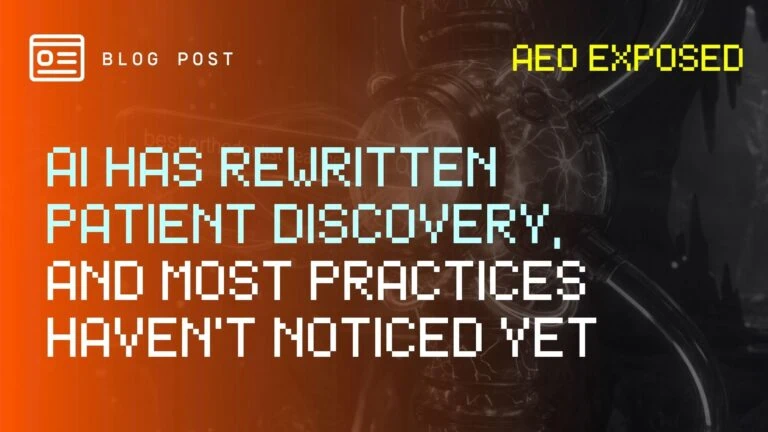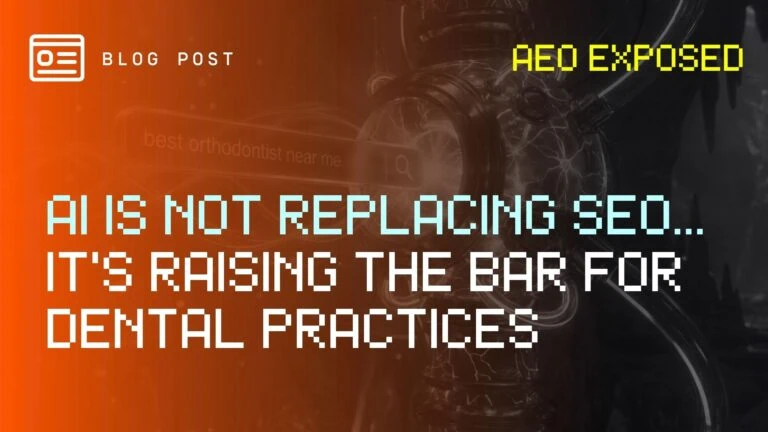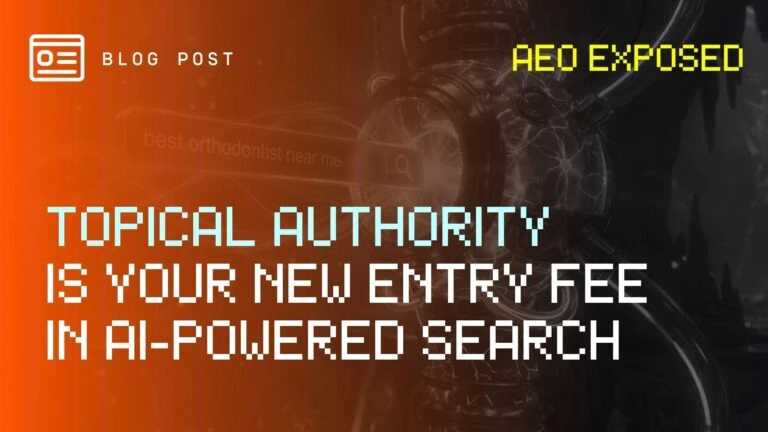Your patients aren’t finding you in just one place anymore. They’re discovering orthodontists in Google Maps, scanning organic results, and reading AI summaries that pick “the best” providers in their city. To show up everywhere they look, start with rock-solid SEO, then layer Answer Engine Optimization for Google’s AI Overviews and Geo-Generative optimization for ChatGPT’s local picks. The fuel behind all three? Real authority you build on your site and across the web.
Lock Down Traditional SEO First
Before you think about AI, nail the basics. Clean page titles, sharp meta descriptions, tight internal linking, and strong on-page structure are still step one. Add consistent link building that lifts your domain authority and supports your key service pages. These fundamentals make everything else work harder.
Why it matters: Competitive markets respond when on-page optimization and authority building stack up over time. One practice hit number one for “orthodontist in Orlando” after months of focused on-page work plus smart off-page signals.
What to check: Titles, metas, internal links, and the crawlability of your core treatment pages so they can carry the authority you’re about to build.
Build E-E-A-T On And Off Your Site
Google and AI systems reward expertise, experience, authoritativeness, and trustworthiness in two places: your own pages and the wider web. On your site, answer real patient questions with depth and clarity. Off your site, create credible signals through press releases, local brand mentions, and contextual links that point straight to the pages you want to elevate. Together these moves raise your off-page authority and overall domain strength.
On-site: Treatment pages and FAQs that reflect actual experience and answer high-intent questions.
Off-site: Strategic placements on reputable outlets and niche publications, plus local citations Google can discover. These reinforce the topics you want to own.
AEO — Win Google’s AI Overviews By Owning Patient Questions
Answer Engine Optimization is about building pages that tackle the exact questions people type, then backing those pages with authority. In practice, create detailed, city-specific answers to high-intent searches like “cost of Invisalign in Orlando,” and support those answers with contextual links and press mentions pointing at the same pages. This combination puts you inside AI Overviews when those question queries fire.
Real-world signal: Question-based searches trigger AI Overviews constantly, and pages that answer with depth plus supporting authority show up or get cited.
Execution notes: Don’t stop at publishing the answer. Route relevant link equity to it with press releases and contextual guest posts so Google sees both quality and proof.
GEO — Influence ChatGPT’s Local Picks
Geo-Generative optimization focuses on how systems like ChatGPT choose and describe the “best” local providers. Specific on-site language plus off-site credibility drives inclusion when someone asks ChatGPT for the “best Invisalign provider in Orlando” or the “best orthodontist in Sandy Springs.” Strategic off-site signals include press releases, high-quality guest posts, and local citations that point contextually back to priority pages.
Proof of concept: ChatGPT recommended one doctor for “best Invisalign provider Orlando” and another practice for “best orthodontist Sandy Springs” after targeted on-site phrasing and off-site authority work aligned.
Authority accelerators: High-authority placements like Yahoo Finance or MSN, when used strategically and linked to specific pages on your domain, build the unshakable authority that lifts search and AI mentions together.
Local Authority Mechanics That Move The Needle
Local authority isn’t vague. It shows up in two places you control.
Citations and discoverability: Make sure your practice exists on the right local and industry platforms, and that Google can find and index those citations. Broad presence helps, but discoverability and relevance to orthodontics are what influence both Maps and generative answers.
Review velocity across platforms: Steady review growth improves Maps rankings and affects how AI systems form “top rated” or “best” lists. Don’t limit yourself to Google alone. Encourage reviews on other platforms that generative systems check.
One Authority System, Three Winning Outcomes
When you align on-site depth, off-site credibility, and local proof, you get a single system that delivers:
- Higher Maps visibility as reviews and citations compound
- Stronger organic rankings as on-page structure and link equity concentrate around priority services
- Citations and inclusion inside AI answers where patients often start their research
Your Execution Checklist
Audit the base. Fix titles, metas, internal links, and crawl paths across core treatment pages. Confirm that link equity flows to your money pages.
Ship five to ten question pages. Create detailed, city-specific answers for the most common treatment questions, then point press releases and contextual guest posts directly to those pages.
Build discoverable citations. List your practice on the local and industry platforms that influence ChatGPT, making sure those profiles are complete and consistent.
Grow reviews across platforms. Encourage ongoing patient feedback on Google and a handful of other sources that generative systems use. Track month-over-month velocity.
Aim for authoritative placements. Use reputable outlets and local publications to publish optimized content with contextual links to target pages. Treat these as credibility assets for both search and AI.
The Bottom Line
Winning search in 2025 means building a durable authority system that powers three outcomes at once: Maps visibility, organic strength, and presence inside AI answers. Traditional SEO for dental practices gives you the base. AEO and GEO extend that base into the places where today’s patients actually make decisions. Keep publishing detailed answers, keep earning credible mentions, and keep your local signals growing. Do this consistently and you won’t just rank. You’ll become the practice that search engines and AI recommend.




